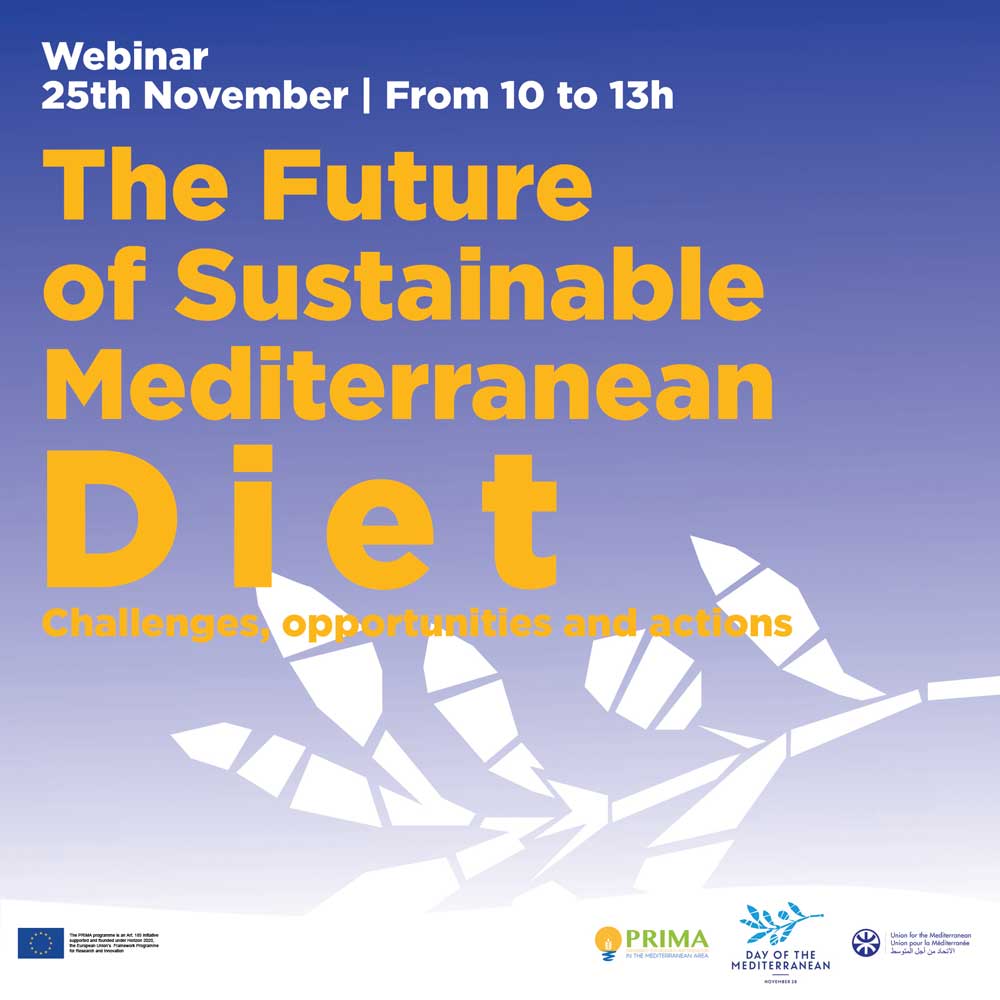
PRIMA is joining the Union for the Mediterranean (UfM) on its choice of the 28th November as the official Mediterranean Day by unanimous decision of its 42 member states. It is the date of the first Euro-Mediterranean Conference, which gathered the Ministers of Foreign Affairs of the EU and 12 Southern and Eastern Mediterranean countries in Barcelona in 1995. They agreed to launch the Euro-Mediterranean Partnership Process, known as the Barcelona Process, a new framework of dialogue to convert the Mediterranean region into a common space for peace, stability, security and shared prosperity.

The Mediterranean is one of the most sensitive regions in the world to climate change. The high sensibility of the hydrological cycle to climate change is a consequence of both the location of the region in a transition zone between a temperate climate in the mid-latitudes and the hotter-drier North African climate and its specific physiographic features. The analysis of observed-based data show that the Mediterranean region has tended to be warmer and drier during the last half century, associated with extreme events.
Pressure on water resources will continue to increase with the serious risk of salinization and desertification of large Mediterranean areas. This is particularly relevant because of the difficulties involved in restoring ecosystems productivity once the desertification process is initiated. Most countries on the Southern and Eastern shores of the Mediterranean are already considered as facing chronic scarcity of water resources and the situation is expected to worsen in the future under the combined effect of increased demand for water and the projected impacts of climate change which
Agriculture is one of the few sectors that can both contribute to mitigation and sequestration of carbon emissions and accounting for agriculture’s carbon footprint is necessary, particularly if agriculture is included in greenhouse gas reduction commitments.
PRIMA is funding a high number of farming projects that most of them are dealing with the adaptation and mitigation to climate changes.
54 funded projects gathering 487 research teams are addressing the adaptation and mitigation to climate change in the Mediterranean. This represents more than 40 percent of the funded projects in 2018, 2019 and 2020. These projects work on two levels first the adaptation to the climate change and second the mitigation to the climate change. A total budget of 62.4M€ has been allocated to the adaptation and mitigation to climate change.




Adaptation refers to changes in processes, practices, and structures in response to the actual or perceived threat of climate change, as well as changes in social and institutional structures and technical options. The adaptative capacity refers to the potential or capability of a system or an individual to make the required adjustments to adapt to the vulnerability of the climate change impact. For agri-food systems, adaptation to climate change involves changes in agricultural management practices in response to changes in climate conditions. The adaptation responses can broadly be distinguished into 3 levels:
This first level of adaptation can include changes in sowing dates, cultivar or crop selection, and the adaptation of water, nutrient, residue and canopy management. PRIMA is funding projects that are tackling the resistance/tolerance to biotic and/or abiotic stress which contribute to the adaptation to drought or to emergent diseases. Also, some projects are dealing with efficient use of water contributing to a better adaptation of crops to climate change.
Examples of projects
Legumed, DiVicia, Zeroparasitics, Cereal Med, UTOPIQ and Supertrout.
PRIMA is contributing to provide affordable technologies for efficient use of water which will assist small farmers in copying with drought conditions in particular in southern Mediterranean countries. Improved irrigation efficiency is an important adaptation tool, especially in dry season.
Examples of funded projects
MEDWATERICE, WATERMED, IRRIWELL.
The systems adaptation refers to the changes of practices of the whole farming system to reduce the vulnerability of climate change impact. PRIMA is funding projects that are addressing the adaptation of the system rather than focusing on the individual level:
Examples of projects
CAMA, Conservaterra, SustainOlive and 4CEMED are good examples of PRIMA funded projects.


Mitigation refers to the technological change and substitution that reduce resource inputs and emissions per unit of output (IPPC). In Agriculture, mitigation is focused primarily on reducing GHG emissions and/or increasing carbon sequestration and storage.
Some projects of PRIMA have the potential to mitigate climate change by reducing the carbon dioxide, nitrous oxide and methane. The projects target the mitigation through carbon sequestration, reduction of ammonia and GHG.
Examples for these projects are:
RECROP, FISHFOTOCAT, FRUALGAE and REVINE.



Thursday 25th November at 10:00-13:00
Online format

PRIMA
Carrer del Gran Capitá, 2-4, 08034 Barcelona
Nexus 1 Building, 3rd floor, 303
+34 930190823
For media enquiries, contact:
Sara Elmaghraby
Communication Director, PRIMA
Tel. +34 603 663 077
NAVIGATION PRIMA / Mediterranean Day
| Cookie | Duration | Description |
|---|---|---|
| cookielawinfo-checkbox-analytics | 11 months | This cookie is set by GDPR Cookie Consent plugin. The cookie is used to store the user consent for the cookies in the category "Analytics". |
| cookielawinfo-checkbox-functional | 11 months | The cookie is set by GDPR cookie consent to record the user consent for the cookies in the category "Functional". |
| cookielawinfo-checkbox-necessary | 11 months | This cookie is set by GDPR Cookie Consent plugin. The cookies is used to store the user consent for the cookies in the category "Necessary". |
| cookielawinfo-checkbox-others | 11 months | This cookie is set by GDPR Cookie Consent plugin. The cookie is used to store the user consent for the cookies in the category "Other. |
| cookielawinfo-checkbox-performance | 11 months | This cookie is set by GDPR Cookie Consent plugin. The cookie is used to store the user consent for the cookies in the category "Performance". |
| viewed_cookie_policy | 11 months | The cookie is set by the GDPR Cookie Consent plugin and is used to store whether or not user has consented to the use of cookies. It does not store any personal data. |